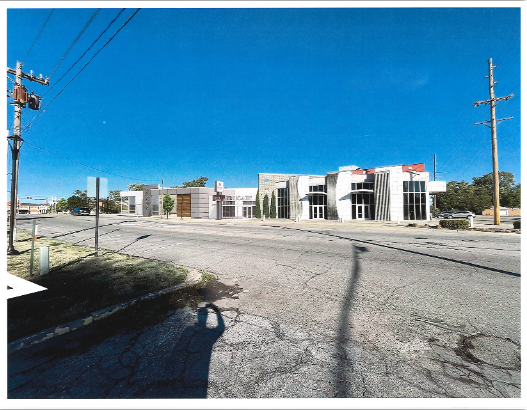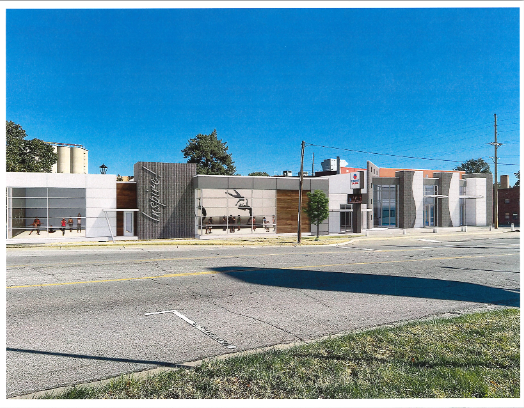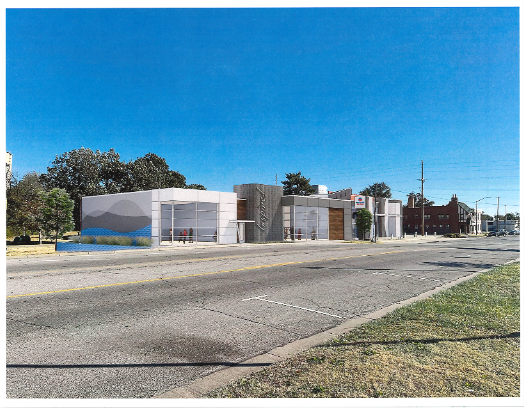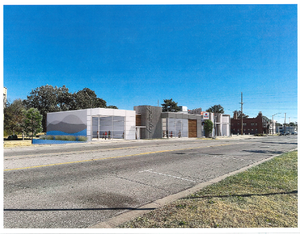UPDATE: This article has been updated with a details provided by Theatre Salina from Monday, November 6th's corresponding City Commission Meeting
"This is a process that began at the Theatre more than four years ago, moved to the City Manager’s office 19 months ago, and has been in negotiations with the City since January of this year. We are truly excited to be at the stage where we can bring this request to you.
This began with the knowledge that our storage building, that rests to the north of the parking lot, was going to become a necessary part of the impending river project. We investigated the cost of creating off-site storage, but with the cost of land, construction, 24-hour security, HVAC, vehicles for transport, and the time it would take limited staff away from the Theatre, we deemed this unfeasible. We decided on a different course.
We decided that creating a new technical building, with multiple uses, attached to the current stage house was necessary. This would serve as storage, and be a transitional area for sets moving on and off our stage. This was the beginning of our planning.
When we created the theatre education wing in 2011, we hoped that we would one day have 150 student registrations to educate young people in the skills it takes for us to accomplish the quality of productions we have provided for 63 years.
Be careful what you wish for. This year, we have more than 450 student registrations across all platforms. Our students range in age from pre-school to adults. More than 35% of students are on scholarship or reduced tuition. No child is ever turned away because of an inability to pay. This year, more than 5,000 students from throughout central Kansas, including parochial and home schooled students, will travel to Salina to see our Center for Theatre Arts Fall and Spring productions. Overall, more than 8000 young people will attend our productions this year.
This led us to contact Charles Renz to create a highly functional, aesthetically exciting space for an educational expansion.
Where will we build? Because of the 2011 expansion, the Theatre owns enough land to the east of the current storage area to accomplish this need. However, this is land that is also encompassed in the river project plans, and we felt we would be better partners if we could accommodate this idea. That ‘s when our discussions began with Mr. Schrage that evolved into our negotiations with Mr. Wood that brought us to this point.
We hope the commissioners agree with us that the unimpeachable value of Theatre Salina and the Center for Theatre Arts as not only an essential part of the cultural tapestry of this community, but as an engine for tourism and economic development warrants your positive consideration. Last year, the Theatre sold tickets in more than 150 cities throughout Kansas and in 28 other states. In the past decade, the Theatre has provided $8,244,906 to the local economy and collected $334,398 in sales tax."
In Monday's City Commission Meeting, the commissioners deliberated on granting authorization for the preparation and publication of a notice regarding the proposed transfer of park property to the Salina Community Theater Association (SCTA) for the expansion of their theater facility into Founders Park. The City of Salina and SCTA have maintained a fruitful partnership since the 1970s. While the original theater building was privately funded, it was owned and maintained by the City. In the early 1990s, the building underwent expansion, and in 2007, SCTA initiated a campaign to further enlarge the facility. This expansion led to the City deeding the building to SCTA and entering into a 50-year maintenance and operations agreement, set to expire in 2057.
SCTA has approached the City with plans to expand their facility to the west, primarily for enhancing their educational offerings and creating a scene shop. This proposed 9,500 square foot expansion encroaches on part of Founders Park. City staff held a Development Review Team meeting with SCTA to better understand the expansion plans. Due to the expansion's location in relation to the Smokey Hill River, the HOR was also involved in the review process. It was concluded that the river plans could be adjusted to accommodate SCTA's expansion.
In discussions concerning property transfer to SCTA, the City staff requested a review of the 2007 maintenance and operations agreement. Under the current agreement, the City is responsible for utilities, janitorial services, and overall facility maintenance, including plumbing, heating, air conditioning, and electrical systems, landscaping, and snow removal. In exchange for these services, SCTA pays the City $3,000 annually. Over the past few months, staff has been collaborating with SCTA to refine the changes to the agreement, focusing on the maintenance cost, janitorial services, and future utility expenses.
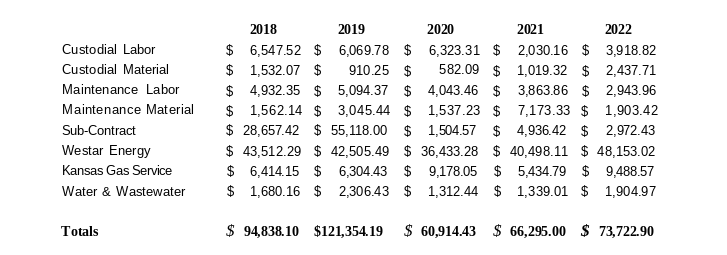
SCTA has agreed to include provisions in the revised agreement to establish an escrow account for significant maintenance expenses. This annual set-aside will begin at $3,000 and increase by 10% until it reaches a cap of $10,000 annually. These funds will be used for maintenance items exceeding $15,000, with the City remaining responsible for smaller maintenance expenses and any costs exceeding the available escrow funds. The average annual expense for maintenance and building repair over the last five years has been $25,000.
The City has also included additional items as part of the facility project with Schneider Electric, such as a Building Automation System costing $159,712 and new lighting at a cost of $91,746. Roof-top HVAC units are not part of the current facility plan. SCTA considered taking on the cost of janitorial services but found that third-party services would exceed $20,000 annually. Therefore, the revised agreement maintains the City's responsibility for janitorial services, with an average annual expense of $6,000.

Most of the discussions revolved around electric utility expenses. City staff proposed placing a cap on the City's future electric utility responsibility to limit ongoing liabilities. SCTA agreed to this cap based on kWu usage, ensuring that the City would cover only a nominal portion of increased utility costs resulting from the building expansion. SCTA also plans to fund a solar array, reducing electric utility costs to the City by an anticipated $25,000 to $35,000 annually.
The revised agreement will be presented for approval alongside the property transfer. Any feedback from the City Commission will be incorporated into the agreement in the meantime.
As for the property transfer, a limited warranty deed with reversionary and limited warranty covenants has been drafted. This deed includes reversionary covenants specifying the terms under which SCTA may own and operate the property. Given that the transfer involves park property, it is subject to K.S.A. 12-1301, which outlines the process for sales or exchanges in connection with parks. Before such a transfer, the city must publish a notice in the official city paper for two consecutive weeks. If no valid protest is filed within 30 days, the transfer can proceed.
The current action before the City Commission was to authorize the preparation and publication of the required notice. If the proposed transfer is not the subject of a valid protest, the execution of the deed will be considered in a future City Commission meeting.
In terms of fiscal impact, the cost of this action is limited to the publication expenses associated with the required notice. If the warranty deed and revised agreement are executed in the future, the City will be responsible for annual janitorial services, ongoing maintenance, and major capital repairs to the expanded facility. The installation of a solar array by SCTA is expected to result in annual electric utility cost savings of $25,000 to $35,000.
The motion was passed 5-0.
